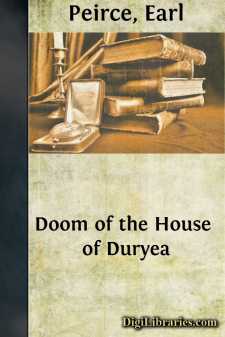Categories
- Antiques & Collectibles 13
- Architecture 36
- Art 48
- Bibles 22
- Biography & Autobiography 813
- Body, Mind & Spirit 142
- Business & Economics 28
- Children's Books 15
- Children's Fiction 12
- Computers 4
- Cooking 94
- Crafts & Hobbies 4
- Drama 346
- Education 46
- Family & Relationships 57
- Fiction 11828
- Games 19
- Gardening 17
- Health & Fitness 34
- History 1377
- House & Home 1
- Humor 147
- Juvenile Fiction 1873
- Juvenile Nonfiction 202
- Language Arts & Disciplines 88
- Law 16
- Literary Collections 686
- Literary Criticism 179
- Mathematics 13
- Medical 41
- Music 40
- Nature 179
- Non-Classifiable 1768
- Performing Arts 7
- Periodicals 1453
- Philosophy 64
- Photography 2
- Poetry 896
- Political Science 203
- Psychology 42
- Reference 154
- Religion 513
- Science 126
- Self-Help 84
- Social Science 81
- Sports & Recreation 34
- Study Aids 3
- Technology & Engineering 59
- Transportation 23
- Travel 463
- True Crime 29
Doom of the House of Duryea
by: Earl Peirce
Description:
Excerpt
Arthur Duryea, a young, handsome man, came to meet his father for the first time in twenty years. As he strode into the hotel lobby—long strides which had the spring of elastic in them—idle eyes lifted to appraise him, for he was an impressive figure, somehow grim with exaltation.
The desk clerk looked up with his habitual smile of expectation; how-do-you-do-Mr.-so-and-so, and his fingers strayed to the green fountain pen which stood in a holder on the desk.
Arthur Duryea cleared his throat, but still his voice was clogged and unsteady. To the clerk he said:
"I'm looking for my father, Doctor Henry Duryea. I understand he is registered here. He has recently arrived from Paris."
The clerk lowered his glance to a list of names. "Doctor Duryea is in suite 600, sixth floor." He looked up, his eyebrows arched questioningly. "Are you staying too, sir, Mr. Duryea?"
Arthur took the pen and scribbled his name rapidly. Without a further word, neglecting even to get his key and own room number, he turned and walked to the elevators. Not until he reached his father's suite on the sixth floor did he make an audible noise, and this was a mere sigh which fell from his lips like a prayer.
The man who opened the door was unusually tall, his slender frame clothed in tight-fitting black. He hardly dared to smile. His clean-shaven face was pale, an almost livid whiteness against the sparkle in his eyes. His jaw had a bluish luster.
"Arthur!" The word was scarcely a whisper. It seemed choked up quietly, as if it had been repeated time and again on his thin lips.
Arthur Duryea felt the kindliness of those eyes go through him, and then he was in his father's embrace.
Later, when these two grown men had regained their outer calm, they closed the door and went into the drawing-room. The elder Duryea held out a humidor of fine cigars, and his hand shook so hard when he held the match that his son was forced to cup his own hands about the flame. They both had tears in their eyes, but their eyes were smiling.
Henry Duryea placed a hand on his son's shoulder. "This is the happiest day of my life," he said. "You can never know how much I have longed for this moment."
Arthur, looking into that glance, realized, with growing pride, that he had loved his father all his life, despite any of those things which had been cursed against him. He sat down on the edge of a chair.
"I—I don't know how to act," he confessed. "You surprize me, Dad. You're so different from what I had expected."
A cloud came over Doctor Duryea's features. "What did you expect, Arthur?" he demanded quickly. "An evil eye? A shaven head and knotted jowls?"
"Please, Dad—no!" Arthur's words clipped short. "I don't think I ever really visualized you. I knew you would be a splendid man. But I thought you'd look older, more like a man who has really suffered."
"I have suffered, more than I can ever describe. But seeing you again, and the prospect of spending the rest of my life with you, has more than compensated for my sorrows. Even during the twenty years we were apart I found an ironic joy in learning of your progress in college, and in your American game of football."
"Then you've been following my work?"
"Yes, Arthur; I've received monthly reports ever since you left me. From my study in Paris I've been really close to you, working out your problems as if they were my own....



